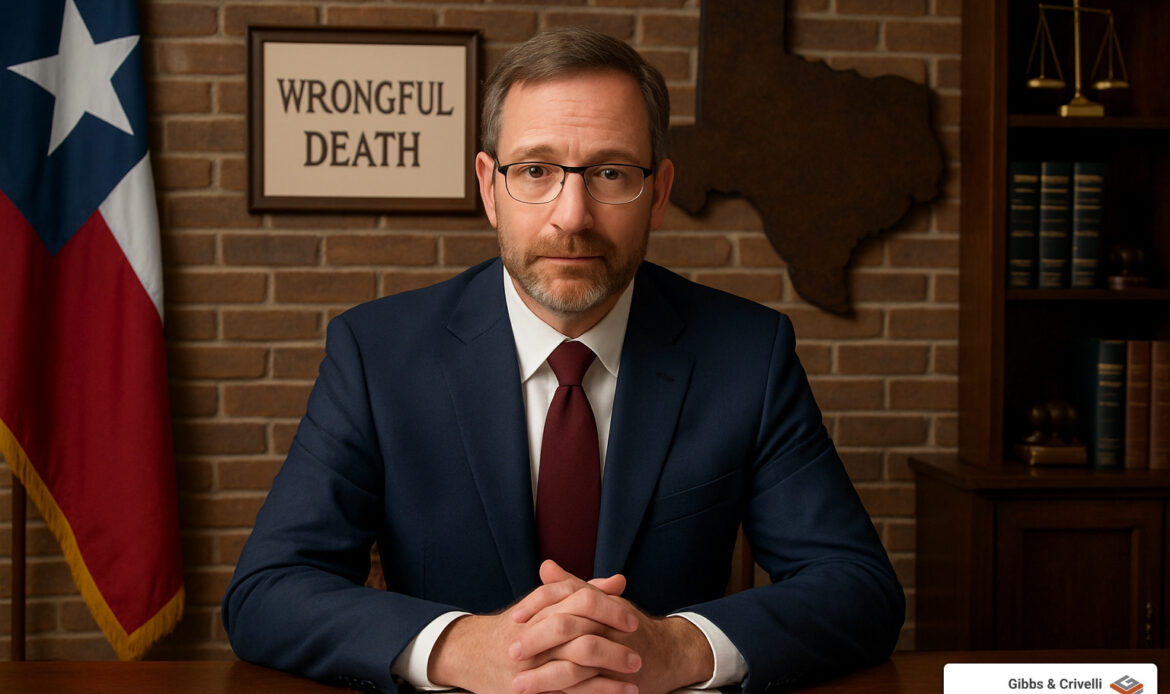Why You Need a Texas Wrongful Death Attorney After Losing a Loved One
If you need a texas wrongful death attorney, you’re likely facing one of life’s most devastating situations. The unexpected loss of a loved one due to someone else’s negligence brings overwhelming grief alongside urgent legal and financial concerns.
Key facts about Texas wrongful death claims:
- Who can file: Surviving spouse, children, or parents only
- Time limit: 2 years from date of death to file a lawsuit
- Damages available: Lost income, companionship, mental anguish, funeral costs
- Burden of proof: Must prove negligence caused the death
- Legal fees: Most attorneys work on contingency (no fees unless you win)
Over 35,000 people die from unintentional injuries in Texas annually. When these deaths result from car accidents, medical malpractice, workplace incidents, or other preventable causes, surviving families have legal rights to seek compensation.
The pain of losing a loved one is indescribable. As one grieving family member shared: “You may feel as though your world has come crashing down on top of you and there’s nothing left in it for yourself or anyone else involved with that person’s life.”
Texas wrongful death law is complex. You must prove four key elements, steer insurance companies, and meet strict deadlines – all while grieving. An experienced attorney handles these legal burdens so you can focus on healing.
The reality is harsh: “Most insurers will try to pay the smallest amount possible to settle a claim.” Without legal representation, families often receive far less compensation than they deserve for their tremendous loss.
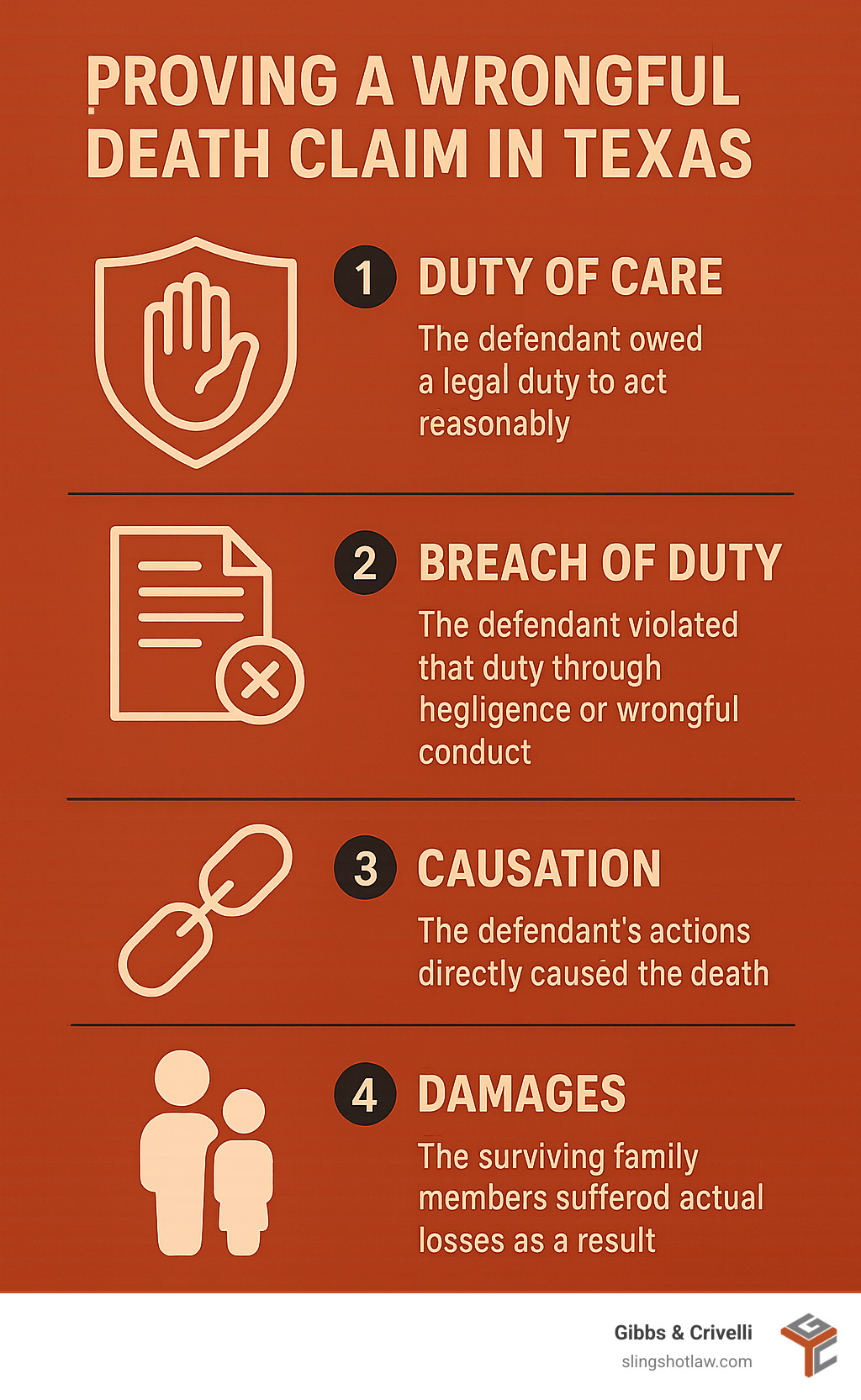
What Constitutes a Wrongful Death Claim in Texas?
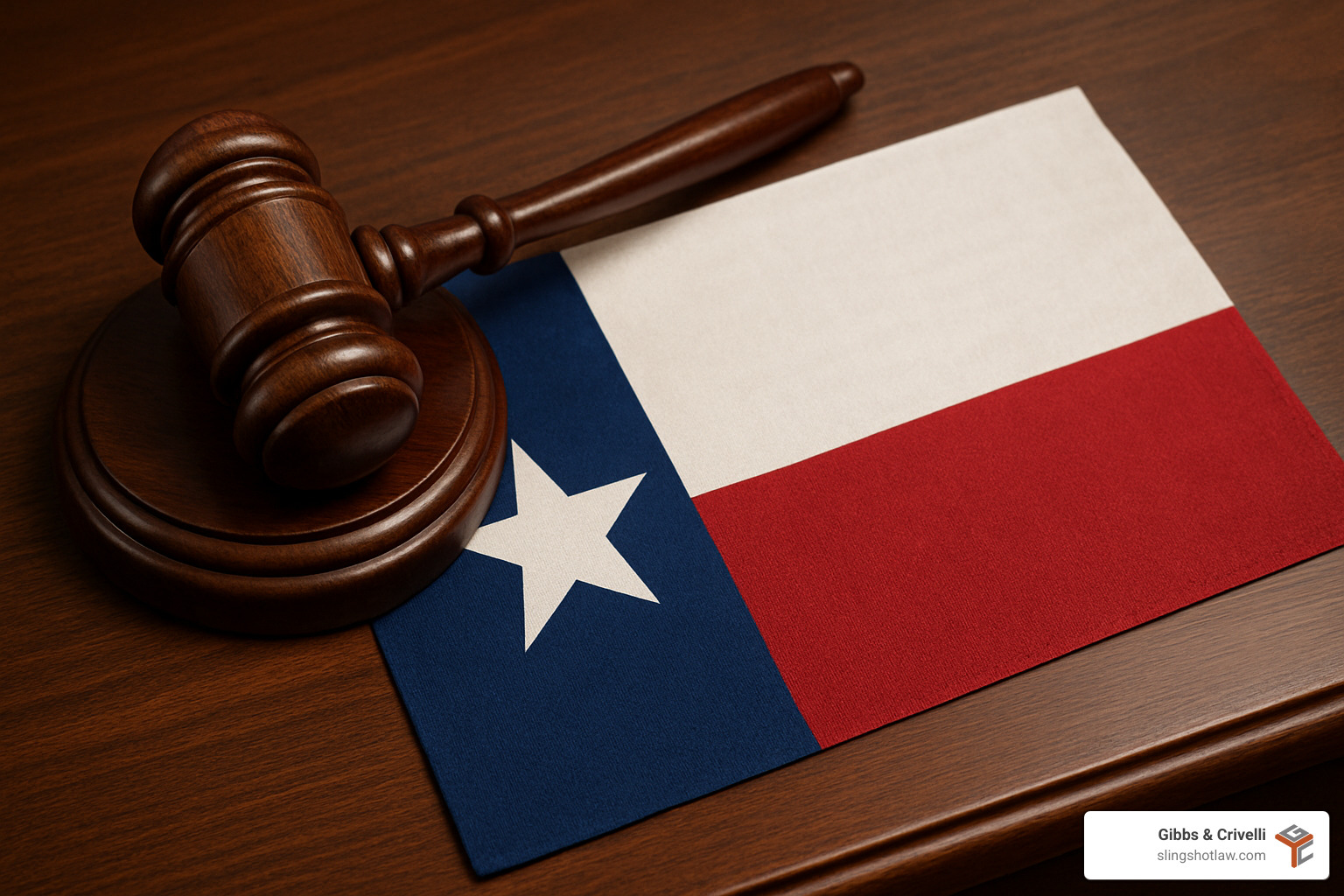
When someone dies because of another person’s actions or failures, Texas law recognizes this as a wrongful death. It’s not just about accidents – the Texas Civil Action and Remedy Code § 71.002 specifically defines wrongful death as occurring when someone dies due to another person’s wrongful act, neglect, carelessness, unskillfulness, or default.
Let’s break this down in plain English. A wrongful act means someone intentionally harmed your loved one. Neglect happens when someone fails to provide proper care – like a nursing home not monitoring a resident. Carelessness covers reckless driving or other negligent behavior. Unskillfulness applies when professionals like doctors or surgeons lack the competence their job requires. Default means failing to fulfill legal obligations.
Here’s something important to understand: wrongful death claims are completely separate from criminal charges. This falls under civil law, where the focus is getting financial compensation for your family, not sending someone to prison.
The legal standards are different too. In criminal court, prosecutors must prove guilt “beyond a reasonable doubt.” In a wrongful death case, your texas wrongful death attorney only needs to show it’s “more likely than not” that the defendant caused your loved one’s death. This lower burden of proof means you might win a civil case even if criminal charges were never filed or didn’t result in conviction.
Who is Eligible to File a Claim? Guidance from a Texas Wrongful Death Attorney
Texas law is pretty strict about who can file a wrongful death claim. The state doesn’t want distant relatives or friends fighting over these cases, so Section 71.004 of the law keeps the list short.
The surviving spouse has the primary right to file. If your husband or wife died due to someone else’s negligence, you can pursue a claim. Children can also file – this includes adult children and legally adopted children. Parents have the right to file if they’ve lost a child, including adoptive parents who have the same legal standing as biological parents.
If none of these primary family members file within 90 days, the executor or administrator of your loved one’s estate can step in and file the claim.
Now here’s what might surprise you – siblings cannot file wrongful death claims directly. Neither can grandparents, fiancés, or close friends, no matter how much they loved the deceased. It might seem unfair, but Texas law draws these clear lines to avoid confusion and conflict.
There are some exceptions worth knowing about. Family members who witnessed the tragic incident might be able to pursue bystander claims if they suffered severe mental or emotional trauma from watching their loved one get hurt or killed.
Common Causes of Wrongful Death in Texas
Every year, thousands of Texans lose their lives in preventable accidents. Understanding the most common causes can help you recognize when you might have a valid claim.
Motor vehicle accidents top the list, claiming over 3,600 lives annually in Texas. Whether it’s a distracted driver, someone running a red light, or a drunk driver, car crashes remain the leading cause of wrongful death. Our Austin Car Accident Lawyer team sees these heartbreaking cases far too often.
Truck accidents deserve special mention because of how devastating they can be. When an 80,000-pound commercial truck collides with a passenger car, the results are often fatal. These cases involve complex federal regulations and multiple parties, which is why our Austin Truck Accident Lawyer specialists focus specifically on these challenging cases.
Workplace accidents are particularly complicated in Texas because the state doesn’t require employers to carry workers’ compensation insurance. This means families often need to pursue wrongful death claims directly against employers or third parties. Our Texas Work Injury Attorney can help steer these complex situations.
Medical malpractice cases involve doctors, nurses, or hospitals failing to provide proper care. This might include surgical errors, misdiagnosis, medication mistakes, or failure to monitor patients properly. These cases require extensive medical expert testimony to prove the healthcare provider fell below accepted standards.
Defective products can turn everyday items into deadly hazards. Whether it’s a faulty car part, dangerous medication, or poorly designed machinery, manufacturers can be held liable when their products cause fatal accidents.
Premises liability cases occur when property owners fail to maintain safe conditions. This could be a slip and fall on an icy sidewalk, a drowning in an unsecured pool, or a fatal accident due to inadequate security. Learn more about Premises Liability Claims and how they work.
Nursing home abuse and neglect sadly claim many elderly lives each year. When facilities fail to provide proper care, medication, or supervision, the results can be fatal. Our Austin Nursing Home Abuse Lawyer fights for families who’ve lost loved ones to institutional neglect.
Drunk driving accidents remain a persistent problem despite decades of awareness campaigns. When impaired drivers get behind the wheel, they put everyone at risk. We handle DWI Injury Claims with the seriousness and urgency they deserve.
Proving Your Case: Liability and Negligence
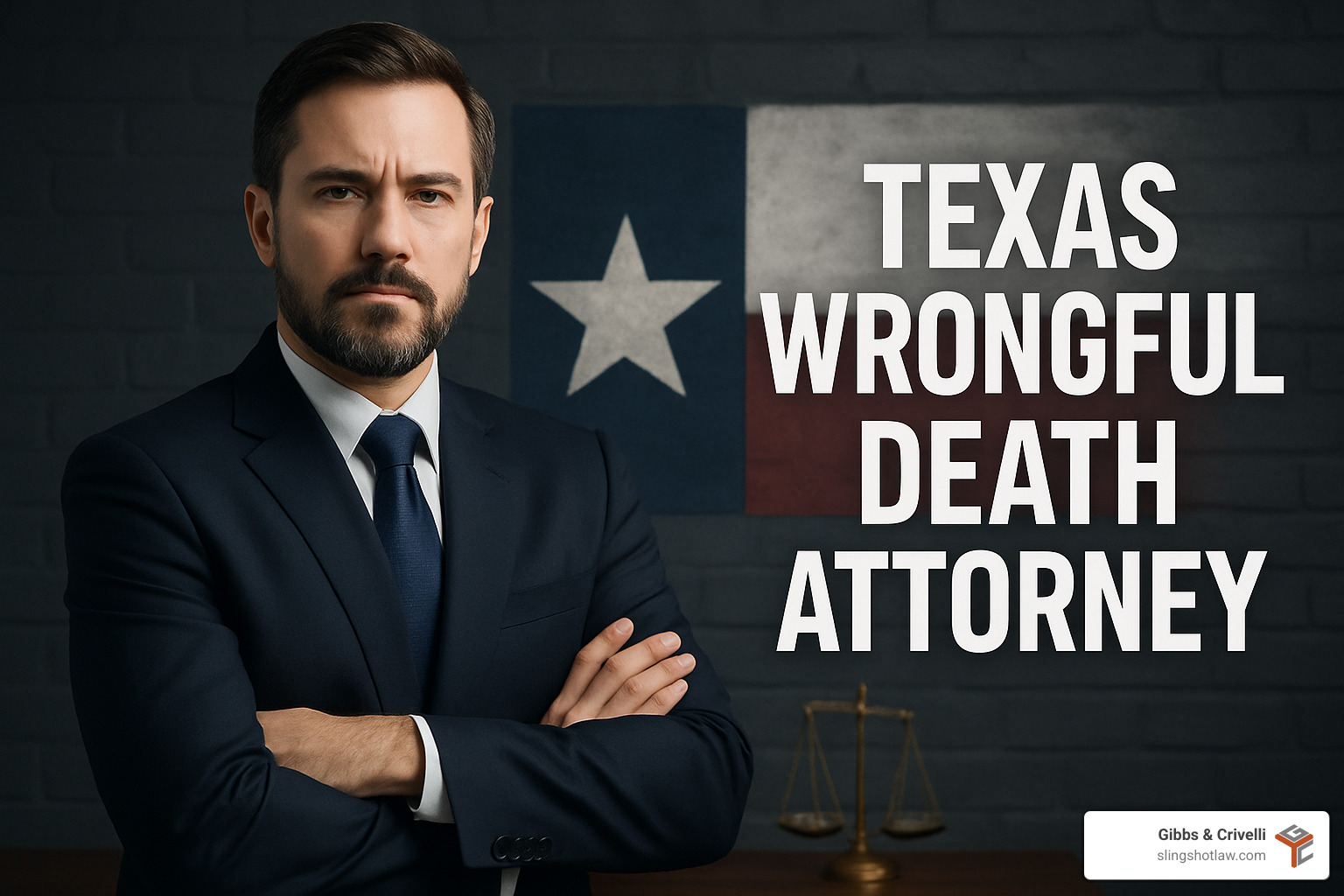
When you lose a loved one due to someone else’s negligence, proving your case requires more than just heartbreak and grief. In Texas wrongful death cases, the burden of proof falls on your shoulders – you must show by a “preponderance of the evidence” that the defendant more likely than not caused your loved one’s death.
This might sound overwhelming when you’re already dealing with such a devastating loss. But understanding what needs to be proven can help you see why having a texas wrongful death attorney on your side makes all the difference.
Under Texas Negligence Laws Explained, every successful wrongful death claim must establish four critical elements. Think of them as the four pillars that support your case.
First, there’s duty of care – the defendant must have owed a legal obligation to act reasonably toward your loved one. For example, doctors have a duty to provide competent medical care, and drivers have a duty to follow traffic laws.
Second comes breach of duty – you must show the defendant violated that obligation through their actions or failure to act. When a doctor performs surgery “in a manner considered unacceptable by the medical community’s standards,” they’ve breached their professional duty.
The third element is causation – proving the defendant’s breach directly caused the death. This can be the trickiest part, especially when multiple factors contributed to the tragedy.
Finally, you must demonstrate damages – that surviving family members suffered actual losses as a result of the death. This includes both financial losses and emotional suffering.
How a Texas Wrongful Death Attorney Establishes Liability
Building a strong wrongful death case requires detective work, legal expertise, and often a race against time. That’s where an experienced attorney becomes invaluable.
Evidence gathering forms the foundation of every case. Your attorney will collect police reports from the scene, interview witnesses while their memories are still fresh, and obtain crucial medical records and autopsy reports. Sometimes the most important evidence comes from expert testimony – accident reconstruction specialists who can piece together exactly what happened in those critical moments.
The clock starts ticking immediately after a death occurs. Preserving evidence becomes urgent because accident scenes get cleaned up, surveillance footage gets recorded over, and witnesses move away. A skilled attorney acts quickly to secure the scene, obtain video footage, and request that relevant documents be preserved before they disappear.
One of the most complex aspects of wrongful death cases involves identifying all potentially liable parties. It’s rarely just one person or company responsible. Corporate liability might extend to employers who failed to provide proper safety training. Government liability could apply if poor road conditions contributed to a fatal crash.
As one attorney explained: “Companies responsible for a death often conceal insurance policies, and a wrongful death lawyer makes formal demands to trigger these policies.” This is exactly the kind of behind-the-scenes work that grieving families shouldn’t have to handle alone.
The investigation process can take months, involving everything from accident reconstruction to reviewing corporate safety records. Your attorney handles this complex work while you focus on healing and supporting your family through this difficult time.
Wrongful Death vs. Survival Action: Understanding Your Legal Options
When tragedy strikes, many families don’t realize they may have two distinct legal claims available after losing a loved one. Understanding the difference between these options is crucial for maximizing your recovery and ensuring your family receives every dollar you deserve.
Think of it this way: a wrongful death claim compensates your family for what you’ve lost, while a survival action compensates your loved one’s estate for what they endured before passing away.
| Aspect | Wrongful Death Claim | Survival Action |
|---|---|---|
| Purpose | Compensates surviving family members | Compensates the deceased’s estate |
| Who Files | Spouse, children, or parents | Estate representative |
| Damages | Family’s losses (support, companionship) | Deceased’s losses before death |
| Hospital Liens | Generally not subject to liens | Subject to hospital liens |
| Beneficiaries | Statutory beneficiaries only | Distributed per will or intestacy laws |
The Texas Survival Statute allows both claims to be pursued simultaneously, often within the same legal filing. A skilled texas wrongful death attorney can help you steer both options to maximize your family’s compensation.
Wrongful Death Claims
Wrongful death claims focus on compensating surviving family members for the devastating impact of their loss. These claims recognize that losing a loved one affects every aspect of your life – emotionally, financially, and practically.
Loss of companionship represents the emotional support, love, and relationship you shared with your loved one. This isn’t just about missing someone – it’s about the daily conversations, shared experiences, and emotional bond that’s been severed.
Mental anguish encompasses the grief, emotional pain, and psychological suffering you’re experiencing. Texas law recognizes that this pain has real value and deserves compensation.
Lost financial support covers the income your loved one would have provided throughout their lifetime. This includes salary, benefits, and other financial contributions they made to your household.
Lost inheritance represents the future wealth your loved one would have accumulated and passed on to you. This forward-looking calculation considers their earning potential and savings patterns.
Only the spouse, children, or parents of the deceased can file wrongful death claims. The court ultimately decides how to divide any recovery among eligible family members.
Survival Actions
Survival actions take a different approach – they compensate the deceased’s estate for what your loved one suffered before death. These claims essentially ask: “What would your loved one be entitled to if they had survived?”
Pain and suffering covers the physical and mental anguish your loved one experienced between the time of injury and death. Even if this period was brief, it can represent significant damages.
Medical expenses include all treatment costs incurred before death – ambulance rides, emergency room visits, surgeries, and intensive care.
Funeral and burial costs represent the final expenses your family faced in laying your loved one to rest.
Lost wages cover income lost between the time of injury and death, plus any sick leave or vacation time used during treatment.
The estate representative files these claims, and proceeds are distributed according to your loved one’s will or state intestacy laws if no will exists.
Here’s an important strategic consideration: When dealing with limited insurance money and large medical bills owed by the estate, it can be wise to seek every dollar possible under the wrongful death claims to avoid large hospital liens. As one attorney explained, “When dealing with limited money to go after and large medical bills owed by the estate, it can be wise to seek every dollar possible under the wrongful death claims in order to avoid large hospital liens.”
This is where having an experienced attorney becomes invaluable – they understand how to structure these claims to maximize your family’s recovery while minimizing the impact of medical liens and other estate obligations.
Recoverable Damages and Compensation in a Texas Lawsuit

Money can never replace the person you lost, but it can keep your family financially secure while you rebuild your life. Texas courts let survivors recover two broad categories of damages—and, in rare cases, a third meant to punish the wrongdoer.
Economic & Non-Economic Damages
Economic damages reimburse the hard costs of your loss:
- Lost earning capacity and future income your loved one would have provided
- Lost benefits (health insurance, retirement, Social Security)
- Medical bills incurred before death
- Funeral and burial expenses
- Loss of inheritance the deceased would likely have built over time
Non-economic damages compensate for the losses you feel but can’t put on a receipt:
- Loss of love, companionship, and consortium
- Mental anguish and emotional distress
- Loss of guidance, care, and household services
Texas judges divide any award among eligible family members “in proportion to the injury they suffered,” weighing factors like dependency, relationship, and the day-to-day role the deceased played at home.
Punitive (Exemplary) Damages
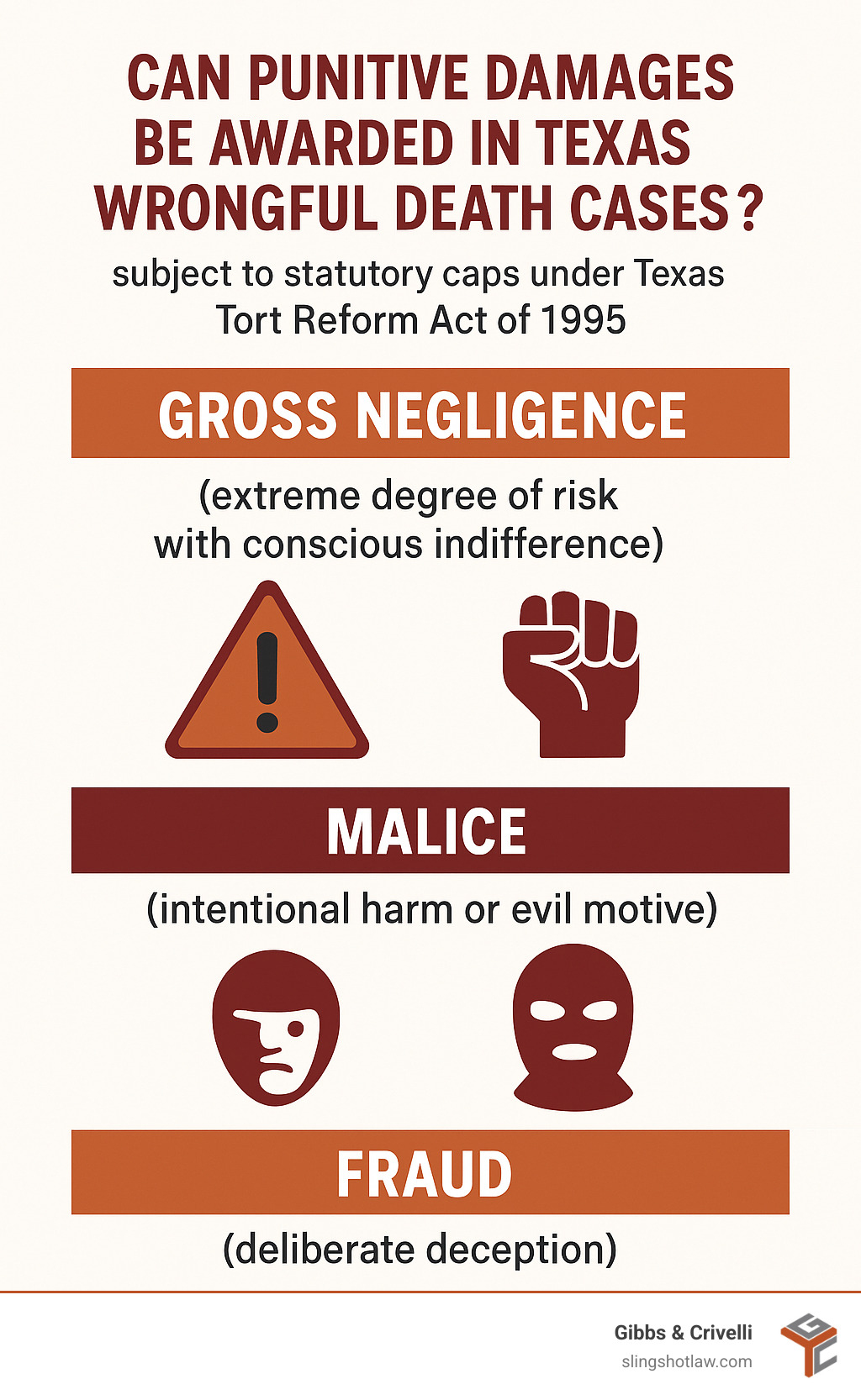
A court may add punitive damages when the defendant’s conduct goes beyond ordinary negligence—think drunk driving or willful safety violations. These awards:
- Punish the wrongdoer,
- Deter similar behavior in the future.
Only spouses and children can receive punitive damages, and Texas caps the amounts under the Tort Reform Act of 1995. Your texas wrongful death attorney can tell you if your facts support such a claim.
Why Amounts Vary So Much
Compensation depends on age, health, career path, and earning potential of the deceased, plus the number of dependents and the circumstances of death. A seasoned lawyer uses economists, medical experts, and vocational specialists to present a clear, data-driven picture of what your family has lost.
If catastrophic injuries preceded death, our catastrophic injuries experience helps us document every penny of additional loss.
The bottom line: a well-prepared claim can mean the difference between financial stability and years of struggle. Don’t settle before you know the full value of your case.
The Legal Process and Why You Need a Texas Wrongful Death Attorney

Wrongful death cases move through four main stages: investigation, insurance claims, negotiation, and—if needed—trial. Each step demands fast action and legal know-how.
Insurance companies hire teams whose sole job is to shrink payouts. They know grieving families rarely understand the true value of a claim or Texas procedural rules. Miss a deadline or overlook evidence, and your leverage evaporates.
The Two-Year Countdown
Under Texas Civil Practice & Remedies Code § 16.003 you usually have two years from the date of death to file suit. Limited extensions exist for minors, late findy, or fraud—but don’t count on an exception. Memories fade, video is erased, and physical evidence disappears within weeks, not months.
How an Attorney Tips the Scales
Most Texas wrongful death attorneys work on contingency, so you pay nothing up front and nothing at all unless they win. The right lawyer will:
- Preserve and analyze evidence before it’s lost.
- Identify every liable party and insurance policy.
- Calculate economic and non-economic damages—including future losses.
- Negotiate from a position of strength because they are fully prepared to try the case.
At Slingshot Law, we back our clients with investigators, medical experts, and accident-reconstruction specialists. More importantly, we handle the paperwork, phone calls, and legal strategy so you can focus on healing.
Free Case Evaluations are always available. Reach out before evidence—and your deadline—slip away.
Conclusion
Losing a loved one is devastating, especially when their death could have been prevented. The grief feels overwhelming, and suddenly you’re facing complex legal questions when all you want to do is mourn.
You don’t have to face this alone. While no amount of money can bring back your family member, Texas law provides a path to justice and financial security for survivors. Understanding your rights is the first step toward healing and moving forward.
The harsh reality is that time is working against you. You have only two years to file a wrongful death claim in Texas. Evidence disappears, witnesses move away, and legal deadlines approach quickly. The sooner you act, the stronger your case becomes.
Insurance companies aren’t on your side. They have teams of lawyers and adjusters working to minimize what they pay your family. Without experienced legal representation, you’re fighting an uphill battle during the most difficult time of your life.
An experienced *texas wrongful death attorney can secure justice and financial stability for your family.* At Slingshot Law, we understand what you’re going through. We’ve helped countless Texas families steer the legal system while dealing with grief and loss.
Our commitment is simple: We fight insurance companies for fair compensation, leveraging our extensive trial experience and dedication to client advocacy. We handle the legal burden so you can focus on healing and spending time with loved ones.
We serve clients throughout Texas, including Austin, Cedar Park, Harker Heights, Killeen, Pflugerville, Round Rock, San Marcos, Temple, and Georgetown. Most importantly, we work on a contingency fee basis – meaning there are no upfront costs and we only get paid if we win your case.
Don’t wait until it’s too late. As one family shared with us: “We didn’t know we had rights until it was almost too late. Thank goodness we called when we did.”
Contact an Austin Wrongful Death Lawyer for a free consultation today. Let us help you seek justice for your loved one and secure the financial stability your family deserves during this difficult time.
Remember: Your road to recovery begins with a free, confidential consultation. We’re here to help you understand your rights and options with no obligation or upfront costs. Take action before time runs out – your family’s future may depend on it.


